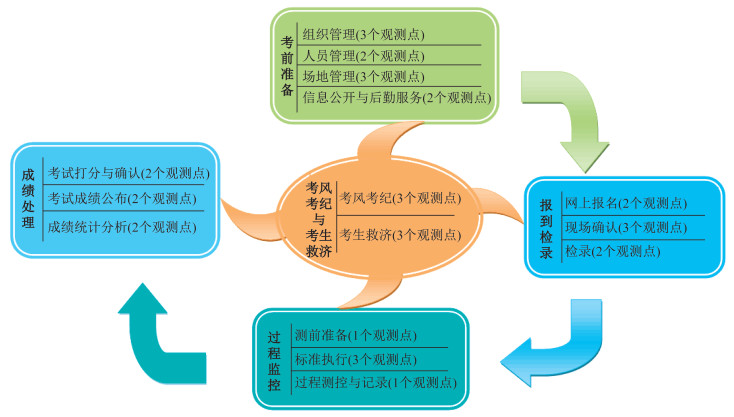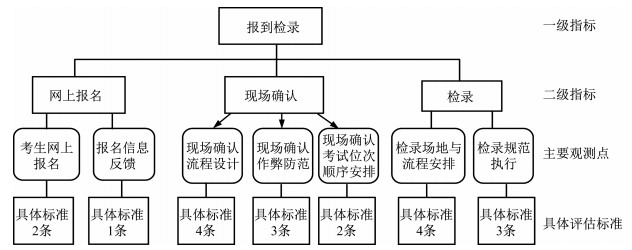System Framework and Practical Value of the Third-Party Supervision and Evaluation in the Specific Admission Test for Physical Education in China
-
摘要: 相对普通高考而言,自1986年开始的体育单招考试组织难度大、专业性强、考试质量难以保障,社会关注度较高。为适应体育单招考试由各组考院校单独组织向全国统一组织考试形式的转变,引进第三方专业机构对体育单招考试实施监督和评估。根据体育单招考试特点,有针对性地建立体育单招考试质量管理监督评估标准体系,确立由5个一级指标(考前准备、报到检录、过程监控、成绩处理、考风考纪与考生救济)、若干二级指标及主要观测点组成的“3级34点”的评估体系,并予以量化,建立“评价—反馈—行动”机制。其价值与意义主要体现为:保障体育单招施测质量,维护高考公信力;开创公众监督和评估国家考试新机制,创新考试治理模式;构建“评价—反馈—行动”学习机制,带动国家考试管理机制改革。Abstract: Since the Specific Admission Test for Physical Education began in 1986, it has always been the focus of the public with its organizing difficulty, strong professional features and poor examination quality which may produce. The third party was thus introduced to supervise and evaluate the specific admission test to suit the change organized by priviouly from various individual colleges and universities to the current general examinations.The specialized quality supervison and evaluation standard system for the test, including 5 firstgrade indicators(that is, pre-test preparation, registration, process supervision, performance result, examination managemen and test-taker assistance), some second-grade indicators and sub-observation points "third-grade 34 points", was therefore established and quantified, so was the "evaluation-feedback-action" mechanism. The evaluation system has ensured the credibility of the test, innovate the test governance mode by developing public supervision and evaluation, and promote the reform in natoinal test management by the construction of "evaluation-feedback-action" learning mechanism.
-
-
[1] 万彩英.我国高校运动训练专业与民族传统体育专业单独招生管理现状及思考[J].北京体育大学学报, 2006, 29(9):1238-1240 doi: 10.3969/j.issn.1007-3612.2006.09.031 [2] 田国垒.一条体育单招灰色利益链湖南师大体院办培训班敛财调查[N].中国青年报, 2010-05-10(7) [3] 胡军.体育特长生招考监管存漏洞[N].中国消费者报, 2010-05-14(4) [4] 新闻晨报.体育生招考监管存漏洞花2000元"枪手"可替考[EB/OL].[2020-03-06].http://sh.qq.com/a/20140306/004928.htm [5] 中共中央, 国务院.国家中长期教育改革和发展规划纲要(2010-2020年): 中发[2010] 12号[EB/OL].[2020-03-06]. http://www.moe.gov.cn/srcsite/A01/s7048/201007/t20100729_171904.html [6] 柳鸣毅.国家体育治理体系和治理能力现代化的思考[J].国家治理, 2016(22):34-40 [7] 李亚东, 俎媛媛.我国第三方教育评价的核心问题辨析及政策建议[J].教育发展研究, 2018(21):1-5 [8] 鄢明明.大规模考试的演变与育人[M].武汉:湖北人民出版社, 2004:259-268 [9] 胡向东.论国家考试公信力建设[J].中国考试, 2005(10):9-13 [10] 王冬梅.信息权力:形塑社会秩序的重要力量[J].天津社会科学, 2010(4):56-59 [11] 刘海峰.高校招生考试制度改革研究[M].北京:经济科学出版社, 2009:1 [12] 希尔伦斯, 格拉斯, 托马斯.教育评价与监测: 一种系统的方法[M].边玉芳, 曾平飞, 王烨晖, 译.北京: 教育科学出版社, 2017: 16 -
期刊类型引用(7)
1. 庞亮亮,高磊. 我国普通高校运动训练专业单招考试:现状、困境与对策. 安徽体育科技. 2024(03): 75-79 .  百度学术
百度学术
2. 常赛. 我国体育单招制度的演进、问题与改革策略. 中国考试. 2024(07): 19-27 .  百度学术
百度学术
3. 常赛. 体教融合视域下我国体育单招制度的历史沿革与演进态势. 安徽体育科技. 2024(04): 1-5 .  百度学术
百度学术
4. 邓奎,戴亏秀. 体育类招生考试考点风险监控与管理研究. 湖北招生考试. 2023(02): 35-38 .  百度学术
百度学术
5. 刘奇,李臣. 普通高校武术与民族传统体育专业单招考试:成就、困境与对策. 武术研究. 2023(11): 81-85 .  百度学术
百度学术
6. 邵景钰,雷鸣. 基于区块链技术的高校高水平运动员招生监测系统设计. 宝鸡文理学院学报(社会科学版). 2023(06): 119-126 .  百度学术
百度学术
7. 李乐虎,高奎亭,舒宗礼. 第三方组织参与我国学校体育监督评估:现状、困境与对策. 北京体育大学学报. 2021(09): 45-55 .  百度学术
百度学术
其他类型引用(6)





 下载:
下载:
